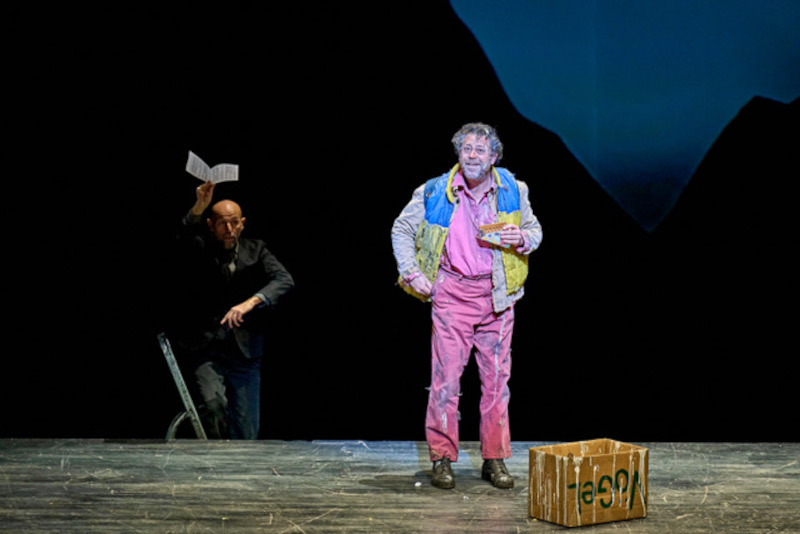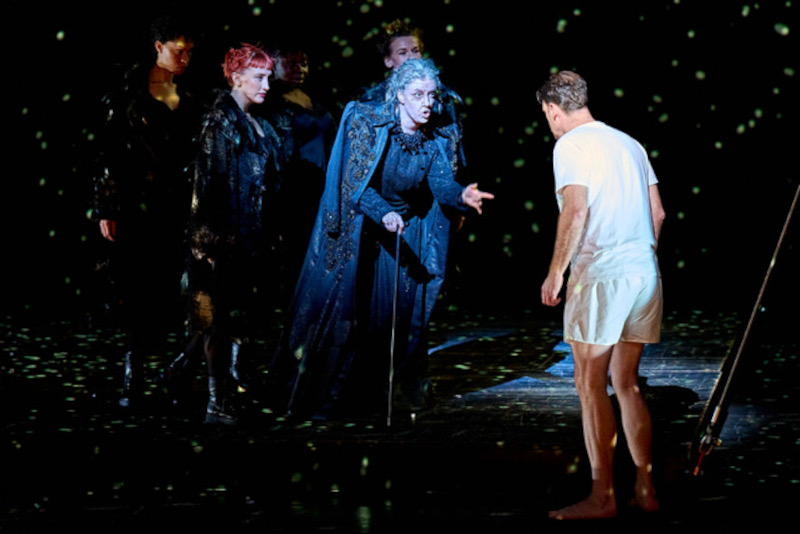Entertainment does not come much more laugh-out-loud than English National Opera’s current run of The Magic Flute, now in its third revival, and notwithstanding recent machinations over the company’s future. Simon McBurney’s 2013 staging, presented in collaboration with the pioneering theatre company Complicité, has lost none of its wit and vigour. ENO’s problems, well known to everyone, are more than alluded to when Sarastro turns to the audience to declare “We are in a time of great crisis”: referring not to the present state of uncertainties at this address, but the body politic surrounding the future of his own hierarchical kingdom.
That moment of sobriety in Act Two is one of the few serious episodes in an otherwise visually arresting and musically persuasive production now under the very capable hands of Racheal Hewer. Enlightenment values, narratives on morals and power are all kept in check, and its boy-meets-girl narrative remains as dotty as ever, here spiced up by Stephen Jeffreys’s English translation. As a contemporary makeover of 18th-century theatrical life in Vienna, this staging underlines in bold marker pen Mozart’s and Schikaneder’s blend of popular theatre. Comedy is helped in no small measure by Ben Thompson’s projected scribblings and Ruth Sullivan’s interactions as a foley artist, where we see sounds and effects being created at the side of the stage. Aerial wizardry, paper birds, and slithering snakes all catch the eye, as do the members of the elevated orchestra. If that doesn’t raise awareness of the usually hidden ENO players, there’s flautist Claire Wickes and the glockenspiel player Murray Hipkin who both periodically mount the stage and add to the fun.

And fun is supplied in spades by David Stout as the stepladder-carrying, bird-catching Papageno. Not only is he superbly communicative with both singers and audience (there’s no fourth wall in this production), he possesses a well-upholstered baritone employed to gratifying effect throughout. If his attempted suicide is not the most moving I’ve seen, his comic timing is impeccable. And there’s one memorable scene with some wine bottles that would surely have appealed to Mozart. There’s a natural chemistry between him and Sarah Tynan’s wide-eyed Pamina, a hugely credible character who consistently claims our attention. Her “Now my joy has gone forever” is especially desolate, an involving rendition saturated with heartfelt expression and gloriously pliable tone: the evening’s emotional high-point. Norman Reinhardt, her besotted prince Tamino, makes the best of his role, his robust tenor bringing a certain nobility to his pursuit of Pamina. If only his diction was as good as his voice.
At the other end of the stave is the mahogany tone of John Relyea’s Sarastro, his cavernous bass allied to an ominous then avuncular stage presence that compels with every movement. No less formidable is Rainelle Krause’s Queen of the Night, her Act Two coloratura pitch perfect with flawless intonation and a remarkable flexibility, all the more impressive for McBurney’s curious idea to have her sing mostly from the confines of a wheelchair. I was less sure about Peter Hoare’s sleazy Monostatos. Vocally impressive, he slips between man-about-town and pantomime villain, and his line “If I can’t have the daughter, I’ll give the mother a go” raises more of a laugh than repulsion, menace not quite cutting through. Elsewhere, Alexandra Oomens makes for a chirpy Papagena, Carrie-Anne Williams, Amy Holyland and Stephanie Wake-Edwards are three resolute and combat-clad Ladies, each determined to ‘befriend’ Tamino, and a mellifluous trio of youngsters convince as Tamino’s ghostly guides.

Any quibbles? The trials by fire and water outstay their welcome, but that’s soon forgotten when Papageno and Papagena chase one another through the front row of the stalls. And with so much amusement on stage, what does it matter too that the plot is largely incomprehensible. Chorus and orchestra responded stylishly to Erina Yashima’s spirited direction, her focus unchallenged by the myriad distractions. All in all, a show not to be missed.
David Truslove
The Magic Flute (Die Zauberflöte)
Music by Wolfgang Amadeus Mozart
Libretto by Emanuel Schikaneder
Tamino: Norman Reinhardt; Papageno: David Stout; Queen of the Night: Rainelle Krause; Queen of the Night; Monostatos: Peter Hoare: Pamina: Sarah Tynan: Sarastro: John Relyea, Papagena ; Alexandra Oomens: First Lady; Carrie-Anne Williams: Second Lady: Amy Holyland; Third Lady: Stephanie Wake-Edwards; Speaker: Jonathan Lemalu; First Priest/First Armed Man: Gavin Ring; Second Priest/Second Armed Man: Ossian Huskinson.
Director: Simon McBurney; Revival Director: Racheal Hewer; Designer: Michael Levine; Costumes: Nicky Gillibrand; Original Lighting: Jean Kalman; Sound Designer: Gareth Fry; Video Designer: Finn Ross; Choreographer: Josie Daxter; Orchestra and Chorus of English National Opera; Conductor: Erina Yashima.
Coliseum, London, Wednesday 28th February 2024.
Top image: Norman Reinhardt as Tamino.
All photos © Manuel Harlan.